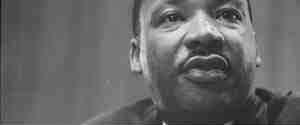MLK Anniversary- King Wanted to Fight Poverty: "It didn't cost the nation one penny to integrate lunch counters".
/
Martin Luther King Jr. wanted to shut down Washington in the spring of 1968. He was organizing what he hoped would be the longest-running protest in the history of the nation's capital.
King called it the Poor People's Campaign. He intended to dramatize the suffering of the nation's poor by bringing them to the capital. Poor people would live together on the National Mall - the long strip of land between the U.S. Capitol and the Lincoln Memorial - and engage in widespread civil disobedience. King wanted to force the federal government to deal with poverty.
In 1967, King spoke frequently about a "new phase" of the civil rights movement. It would focus on economic justice for poor people. While the civil rights movement had won the desegregation of public accommodations and broad new voting rights for black citizens, King said these victories had done little to vanquish one central problem: poverty.
"For King and many others, there's a very depressing realization in 1965 that what they thought would represent victory turns out not really to represent anywhere near the degree of fundamental change that they previously had imagined it would," says David Garrow, author of Bearing the Cross: Martin Luther King Jr. and the Southern Christian Leadership Conference. So long as black people remained poor, they would never really be free, King declared. He felt it was his job to steer the movement in a new direction.
King predicted that attacking poverty would be much more difficult than earlier civil rights campaigns. On June 25, 1967, King gave a speech at Victory Baptist Church in Los Angeles. "We aren't merely struggling to integrate a lunch counter now," he said. "We're struggling to get some money to be able to buy a hamburger or a steak when we get to the counter." The struggle for economic equality would cost a lot more than the fight to defeat Jim Crow segregation.
It didn't cost the nation one penny to integrate lunch counters. It didn't cost the nation one penny to guarantee the right to vote. The problems that we are facing today will cost the nation billions of dollars.
The rate of poverty in the U.S. was near an all-time low in 1967, at roughly 12 percent, but for African Americans, it was more than double that. Blacks still suffered much higher rates of unemployment, illiteracy and malnourishment than whites. What was needed, King said, was "a radical redistribution of economic and political power."
King's right-wing critics had long been calling him a communist. King knew his demand for the redistribution of wealth would draw their fire. The FBI used King's alleged communist leanings as a pretext for spying on him and his associates. But King said he was not a communist. In a speech he gave on August 16, 1967, King explained why. Addressing the annual convention of the Southern Christian Leadership Conference (SCLC), King said the inspiration for his ideas came not from Marx or Lenin, but from the Gospel of Jesus Christ. [more]




























































































































































































































































































